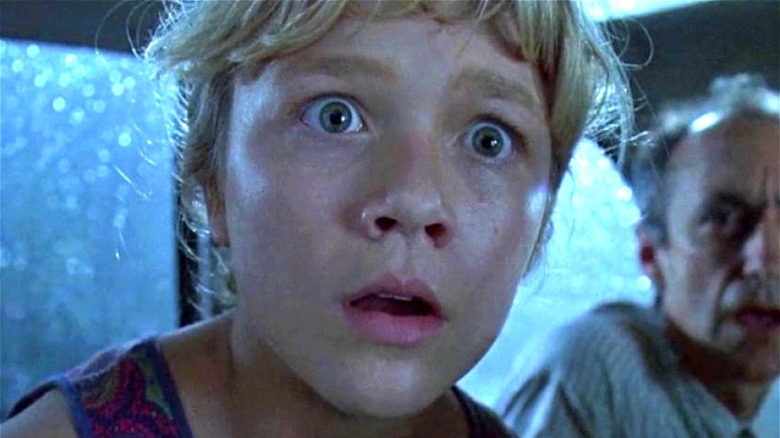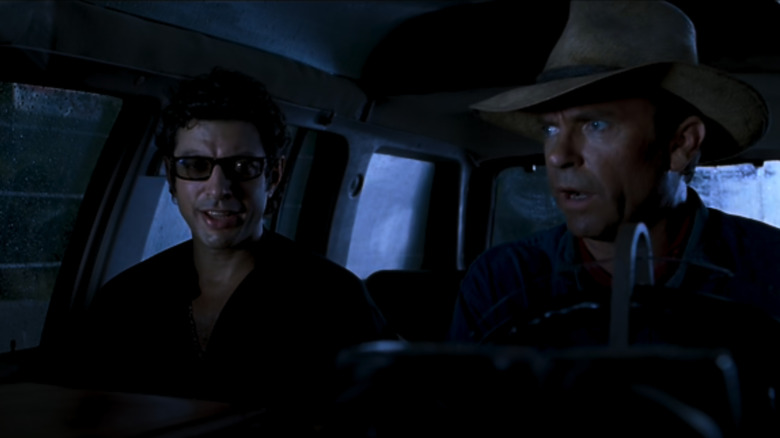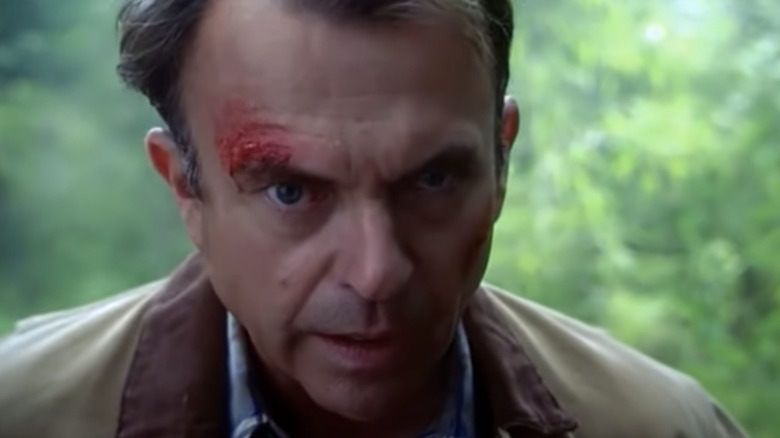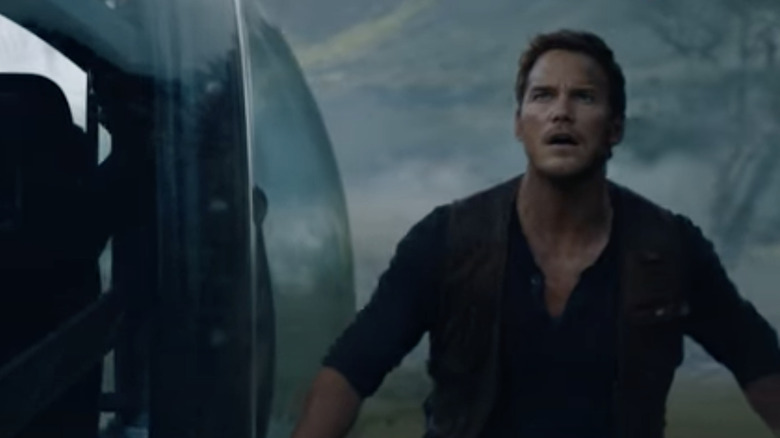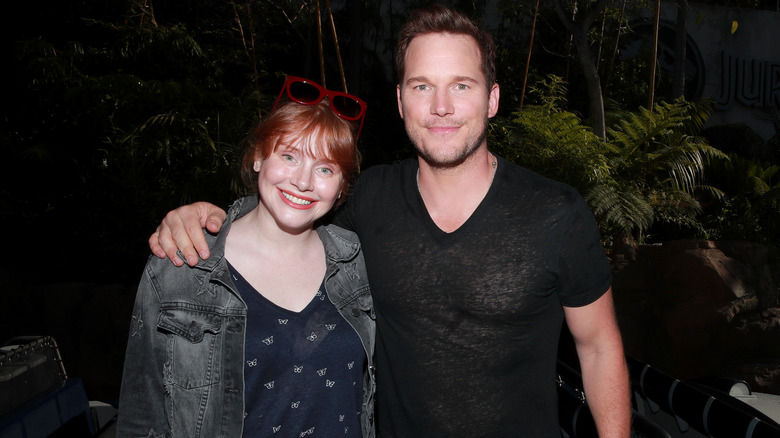The Correct Order To Watch Every Jurassic Park Movie
As franchises grow, it can be a challenge for new fans to get caught up with the internal chronology. "Star Wars" has this issue, with the originals, the prequels, the sequels, and now multiple spin-off shows appearing on Disney+, like "The Mandalorian." It's difficult enough for veteran fans — let alone newcomers — to agree on the proper viewing order. "The Fast and Furious Saga" and the MCU are just two more examples of franchises that have grown so vast that the proper viewing order has become obfuscated. Then we have "Jurassic Park."
Cinematically speaking, the dino franchise is comprised of two loosely bound trilogies separated by significant gaps in both real and fictional time. While the chronology might not be all that complicated, the naming conventions certainly are. Instead of a simple numerical system, the movies were released with a confusing mixture of subtitles and intermittent numbering. That said, if you're looking to go through the material in the most logical order, we've got you covered.
Start with Jurassic Park (1993) and The Lost World: Jurassic Park (1997)
Unlike the other aforementioned series, if you want to watch the "Jurassic Park" series in the "correct" or chronological order, you get to start with the first film, released back in 1993, directed by Steven Spielberg and starring Sam Neil's Alan Grant, Laura Dern's Ellie Satler, and Jeff Goldblum's Dr. Ian Malcolm, along with supporting performances from Richard Attenbourough and Samuel L. Jackson. This is the first time we are introduced to the partially finished dinosaur-cloned theme park, and learn all of the backstory about how Attenbourough's John Hammond created it. We all saw how one wrong move or bad egg (like, say, Wayne Knight's Dennis Nedry) could set off a chain of disastrous Jurassic events.
Next up, considering it directly follows the events of the first installment, is "The Lost World: Jurassic Park." Grant and Satler are absent, shifting to focus on Goldblum's Dr. Ian Malcom as he and a group of researchers head to study the now free-roaming dinosaurs that have taken over what was left of the old dinosaur theme park after it was abandoned. They run into InGen again, who have other plans for bringing some dinosaurs to San Diego. After a few deaths and some wholesale destruction, the dinosaurs are sent back to Isla Sorna. Not only is this film correctly placed chronologically, we're able to see the development of man's desire to continue experimenting with the natural cycle of life.
Don't skip Jurassic Park III (2001)
This is the only logical film to view next considering it takes place years after the events of the first two installments, but long before the sequel "Jurassic World" trilogy. Despite its lack of an identifying subtitle, the film brings back Alan Grant and Ellie Satler after the trauma of their first experience with the engineered dinosaurs.
Due to what appears to be financial necessity, Grant agrees to go back to the island after swearing he'd never go again. Why, you ask? To take a wealthy couple sightseeing obviously. Unsurprisingly, it doesn't go great, and some nefarious ulterior motives are revealed under the surface of the couple's request. It ends up being a scramble to escape the island. With a somewhat strained inciting incident and without Spielberg at the helm, the film didn't do so well with critics. However, it does deepen the series' mythology, critically confirming that velociraptors could in fact communicate with each other, a theory proven correct by Alan Grant.
The new trilogy: Jurassic World, Fallen Kingdom, and Dominion
After a 14-year hiatus the next installment in the "correct" order would be "Jurassic World," now starring Christ Pratt's Owen Grady and Bryce Dallas Howard's Claire Dearing.
Fans return to find a theme park on the original island that is finally completed and seemingly functional with no issues, and we are introduced to Grady's ability to communicate with and understand velociraptors. He's essentially a dino Dr. Doolittle, which makes some sort of sense after the revelations in "Jurassic Park III." Some familiar faces return, and the film largely provides a satisfying continuation of the story with a new set of characters who encounter the same issues arising from the hubris of science generally and genetically engineered dinosaurs specifically.
"Fallen Kingdom" isn't numbered, but it continues the story of Grady and Dearing. This time our heroes mount a rescue mission back to the island of the now (twice) deserted theme park to save the roaming dinosaurs that are about to be killed by an active volcano. If that sounds like a solution in search of a problem, than you've certainly been paying attention. The story takes an incredibly bold turns with the discovery of a black market dinosaur auction and the creation of a successful human clone. The end of the film sees the cloned dinosaurs unleashed on society by the cloned human, thus beginning the neo-Jurassic age, as Dr. Ian Malcolm puts it in his appearance at the end of the film — pretty wild.
Jurassic World: Dominion (2022)
The plot of the sixth film in the series remains a mystery, but it's a safe best it'll be best viewed after you have the first five under your belt. "Fallen Kingdom" left our heroes in a very precarious position, with the literal fate of the world at stake.
Whether you watch the films in the correct order or not, it should be rather easy to understand the main themes and make your way around to every single installment to know what's going on in the "Jurassic Park" universe. Also, so far, there are no "Jurassic Park" prequels to the originals, which makes things easy — every new film in the series is a sequel, though completists should feel free to shoehorn in the Netflix animated series "Camp Cretaceous" anywhere they see fit within the chronology of the second trilogy.
